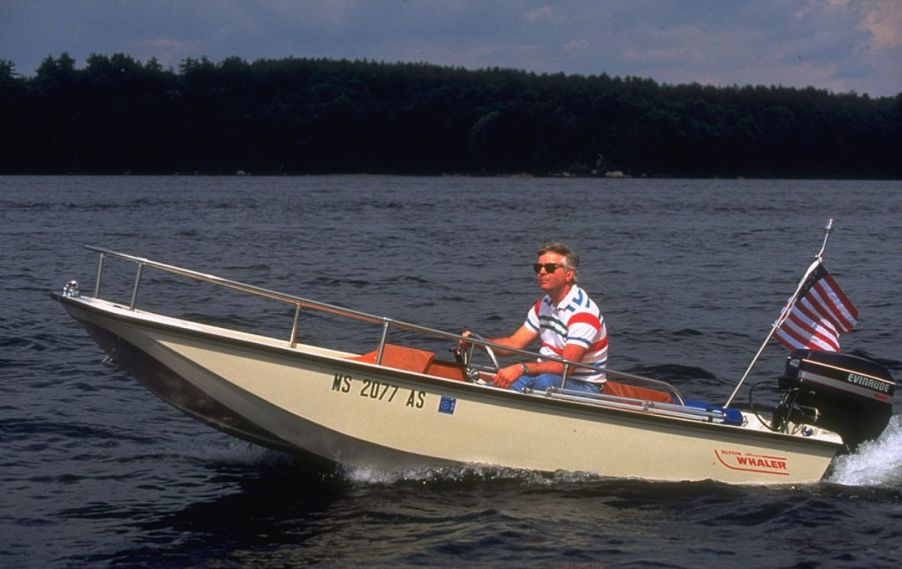
The History of Boston Whaler
Boston Whaler is a name synonymous with quality and craftsmanship in the boating world. The company has been producing some of the most reliable and innovative boats on the market, earning a reputation for their durable construction and versatile design. From their signature unsinkable foam-filled hulls to their cutting-edge features, these boats have become a favorite among boaters and fishing enthusiasts alike. We will explore the history of Boston Whaler, from its humble beginnings to its current status as a leading boat manufacturer.

The evolution of the Boston Whaler
Boston Whaler was founded in 1958 by Richard T. Fisher and C. Raymond Hunt, two avid boaters who wanted to create a safer and more durable boat that could handle the rough waters of the Atlantic Ocean.
Fisher’s first product was a 13-foot boat that he called “The Cox’n”, later renamed the “Standard” model. ContinuousWave reports that he showed it at the 1958 New York Boat Show and received an overwhelming response from the public.
The boat could float even when cut in half, demonstrating its remarkable safety and stability. Fisher soon set up a production facility in Braintree, Massachusetts, and hired Bob Dougherty, an industrial arts teacher who would become his chief designer and engineer.
The company expanded its product line to include larger models, such as the 16-foot hull introduced in 1961. The boats were marketed as “Boston Whalers” and gained popularity among fishermen, recreational boaters, and commercial users. The military and law enforcement agencies also used them for various purposes, such as patrol, rescue, and combat.
In 1969, Fisher sold the Boston Whaler company to CML-Group, a specialty marketing company based in Acton, Massachusetts. Under CML-Group’s ownership, Boston Whaler continued to grow and innovate, introducing new models and features such as the Outrage series, the Montauk series, the V-hull design, the Accutrack hull system, and the Unibond construction method. The company also moved its production facility to Rockland, Massachusetts, in 1988.
In 1989, CML-Group sold Boston Whaler to Reebok International Ltd., a sportswear company that wanted to diversify its portfolio. Reebok invested heavily in Boston Whaler’s research and development, marketing, and distribution. The company also relocated its headquarters to Edgewater, Florida, where it built a new state-of-the-art manufacturing plant.
Ultimately the deal proved to be an unwise business move for Reebok. They sold Boston Whaler to Meridian in 1993 for a $25 million loss to Meridian Sports. The new owner of the brand would only hold onto it until 1996.
That year Brunswick, a massive conglomerate of boating/recreation companies, would scoop up Boston Whaler. This move stabilized Boston Whaler, which is still under the Brunswick family today.
Boston Whaler’s reputation for safety and quality
Boston Whaler’s commitment to innovation, quality, and safety has helped it maintain its position as one of the most trusted names in the boating industry. The company’s innovative designs and construction methods have set industry standards, while its dedication to customer satisfaction has earned it a loyal following.
Boston Whaler boats are known for their durability, stability, and unsinkable design, making them popular among boaters of all types, from fishermen to recreational users to law enforcement agencies.
In addition, Boston Whaler’s extensive dealer network and exceptional customer service have contributed to its reputation as a trustworthy brand. The company offers a range of resources and support services to help customers select and maintain their boats, including personalized consultations, financing options, warranty programs, and training courses.
Committed to customer service and environmental sustainability
Boston Whaler has always been committed to providing exceptional customer service and support throughout the entire ownership journey. They have a network of authorized dealers and service centers worldwide that offer expert advice and assistance.
They also have a dedicated customer care team that can answer questions and resolve issues via phone or email. Moreover, they have a vibrant online community of boaters who share their experiences and tips on social media platforms and forums.
The company is also conscious of its environmental impact and social responsibility. They have implemented various measures to reduce their carbon footprint and waste generation, such as using recycled materials, optimizing their manufacturing processes, and adopting green practices in their facilities.
They have also supported various causes and organizations that promote conservation, education, and community development.


